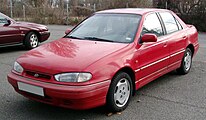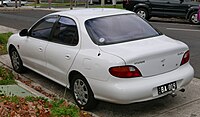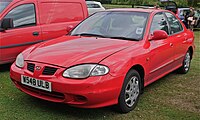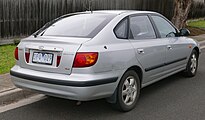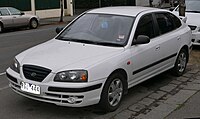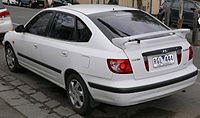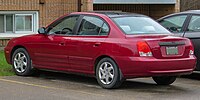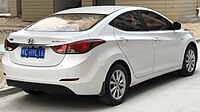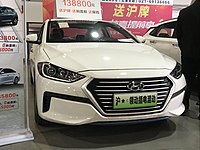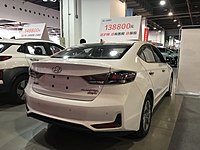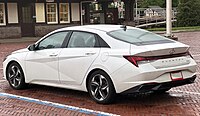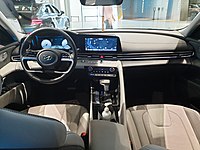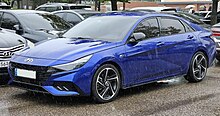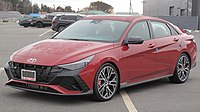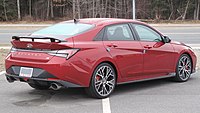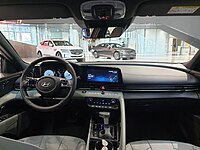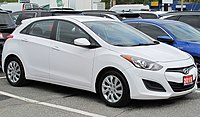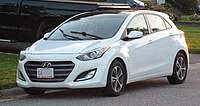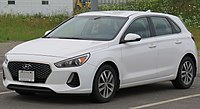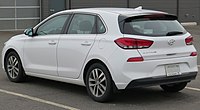Hyundai Elantra
| Hyundai Elantra | |
|---|---|
 | |
| Overview | |
| Manufacturer | Hyundai |
| Also called | Hyundai Avante Hyundai Lantra (1990–2000) Hyundai i30 Sedan (2020–present) |
| Production | 1990–present |
| Body and chassis | |
| Class | Compact car (C) |
| Layout | Front-engine, front-wheel-drive |
| Chronology | |
| Predecessor | Hyundai Stellar (South Korea) |
The Hyundai Elantra (Korean: 현대 엘란트라), also known as the Hyundai Avante (Korean: 현대 아반떼), is a compact car produced by the South Korean manufacturer Hyundai since 1990. The Elantra was initially marketed as the Lantra in Australia and some European markets. In Australia, this was due to the similarly named Mitsubishi Magna Elante model;[1] similarly, in other markets, the name Avante is not used due to its similarity with Audi's "Avant" designation, which is used for their line-up of station wagons.[2] The name was standardized as "Elantra" worldwide in 2001 (except in South Korea, Singapore and Russia).[3]
First generation (J1; 1990)
[edit]| First generation | |
|---|---|
 | |
| Overview | |
| Model code | J1 |
| Also called | Hyundai Lantra (Australia, Europe) Bimantara Nenggala (Indonesia) |
| Production | 1990–1995 1995–1998 (Indonesia) |
| Assembly | Ulsan, South Korea Bekasi, Indonesia (1995–1998) |
| Body and chassis | |
| Body style | 4-door sedan |
| Related | Mitsubishi Mirage |
| Powertrain | |
| Engine | |
| Transmission | 5-speed manual 4-speed automatic |
| Dimensions | |
| Wheelbase | 2,500 mm (98.4 in) |
| Length | 4,375 mm (172.2 in) (1990–1993) 4,405 mm (173.4 in) (1993–1995) |
| Width | 1,675 mm (65.9 in) (1990–1993) 1,680 mm (66.1 in) (1993–1995) |
| Height | 1,395 mm (54.9 in) (1990–1993) 1,390 mm (54.7 in) (1993–1995) |
| Curb weight | 1,064–1,187 kg (2,346–2,617 lb) |

The Elantra (codename J1) was launched in October 1990, and received a mid-term facelift in 1993.
It was sold in Europe from the spring of 1991. It replaced the somewhat larger on the outside Stellar, although that model had not been offered in many markets. The Elantra competed with the likes of the Ford Sierra and Vauxhall Cavalier/Opel Vectra, but at a considerably lower price.
The Elantra was powered by a Mitsubishi-designed 1.6 L (1595 cc) straight-four. This DOHC 16-valve 1.6 L unit produced 113 PS (83 kW) at 6000 rpm and could push the Elantra to 60 mph (97 km/h) in 9.5 seconds. The quarter-mile (0.4 km) run took 17.1 seconds and produced 129 km/h (80 mph). Top speed was 187 km/h (116 mph). The Elantra got 22 mpg‑US (11 L/100 km) in the city cycle. Starting in 1993 a Mitsubishi-designed 1.8 L (1836 cc) inline-four option was available; this unit produces 135 PS (99 kW) at 6000 rpm and replaced the twin-cam 1.6 in the home market.
Facelifts
[edit]The vehicle featured ABS brakes, front airbags, fog lamps, power-operated side mirrors, and optional alloy seven-spoke wheels.
Between 1995 and 1998, the first-generation Elantra was also produced and sold for the Indonesian market as the Bimantara Nenggala, it is only available in there with 1.6 L engine.
-
Facelift
-
Facelift
Second generation (J2/RD; 1995)
[edit]This section may need to be rewritten to comply with Wikipedia's quality standards. (September 2020) |
| Second generation | |
|---|---|
 | |
| Overview | |
| Model code |
|
| Also called | Hyundai Avante (South Korea) Hyundai Lantra (Australia, Europe) |
| Production | 1995–2000 |
| Model years | 1996–2000 |
| Assembly | South Korea: Ulsan Botswana: Gaborone(TMBC)[4] |
| Designer | Choi Jong-Min |
| Body and chassis | |
| Body style | 4-door sedan 5-door station wagon |
| Related | Hyundai Tiburon |
| Powertrain | |
| Engine | |
| Transmission | 5-speed manual 4-speed automatic |
| Dimensions | |
| Wheelbase | 2,550 mm (100.4 in) |
| Length | 4,420 mm (174.0 in) (1995–1998 Sedan) 4,450 mm (175.2 in) (1995–1998 Wagon) 4,450 mm (175.2 in) (1998–2000 Sedan) 4,515 mm (177.8 in) (1998–2000 Wagon) |
| Width | 1,700 mm (66.9 in) (1995–1998) 1,735 mm (68.3 in) (1998–2000) |
| Height | 1,395 mm (54.9 in) 1,460 mm (57.5 in) (1998–2000 Wagon) |
The second generation (codename RD or J2) was launched in 1995, offered as a sedan and station wagon. It was sold in the South Korean market as the "Hyundai Avante" in sedan form and "Avante Touring" in the wagon body style. Some export markets such as Australia and Europe received the series as the "Hyundai Lantra" as per the first generation. Australian market wagons were given the "Lantra Sportswagon" name.
Facelift
[edit]New grilles arrived in 1998 for the 1999 model year. The Lantra in Europe converged into a single-front end design, for both sedan and wagon. The model received the "RD2" or "J3" model codes. A PSA-built 1.9 L naturally-aspired diesel option was also added for some European markets, producing 68 PS (50 kW).
A new 2.0 L engine option became available. In Australia, the GLS model was an upgrade on the GL model and offered the 2.0 L engine, velour trim, softer cloth seats, and alloy wheels. The GLS had body-coloured rear license plate light holder and exterior side-view mirrors.
-
Sedan (facelift)
-
Sedan (facelift)
-
Wagon (facelift)
-
Interior (facelift)
Third generation (XD; 2000)
[edit]| Third generation | |
|---|---|
 | |
| Overview | |
| Model code | XD |
| Also called | Hyundai Avante XD (South Korea, Iran) |
| Production | 2000–2006 (South Korea) 2001–2012 (Venezuela) 2003–2014 (China) 2004–2010 (India) 2005–2012 (Iran) 2008–2009 (Russia) |
| Model years | 2001–2006 |
| Assembly | Ulsan, South Korea Beijing, China (Beijing Hyundai) Iran: Kerman (RVMCO) Malaysia: Johor Bahru (OASB)[5] Russia: Taganrog (TagAZ)[6] Taiwan: (SYM Motors)[citation needed] Ukraine: Cherkasy (Bogdan)[7] Venezuela: Barcelona (MMC Automotriz)[8] |
| Body and chassis | |
| Body style | 4-door sedan 5-door Liftback |
| Related | Hyundai Tucson Hyundai Matrix Hyundai Tiburon Kia Spectra Kia Sportage |
| Powertrain | |
| Engine | Petrol: 1.5 L Alpha II I4 1.6 L Alpha II I4 1.6 L Beta I4 1.8 L Beta II I4 2.0 L Beta II I4 Diesel: 1.5 L U I4 2.0 L D I4 |
| Transmission | 5-speed manual 4-speed automatic |
| Dimensions | |
| Wheelbase | 2,610 mm (102.8 in) |
| Length | 4,510 mm (177.6 in) (2000–2003 Sedan) 4,495 mm (177.0 in) (2000–2003 Liftback) 4,525 mm (178.1 in) (2004–2006 Sedan) 4,520 mm (178.0 in) (2004–2006 Liftback) |
| Width | 1,720 mm (67.7 in) (2000–2003 Sedan) 1,725 mm (67.9 in) (2004–2006 Sedan) 1,720 mm (67.7 in) (Liftback) |
| Height | 1,425 mm (56.1 in) |
| Curb weight | 1,195 kg (2,635 lb) |
| Chronology | |
| Successor | Hyundai i30/Elantra Touring (station wagon/Estate |
An all-new model (codename XD) was launched in 2000. The station wagon version was dropped in favor of a five-door Liftback. Starting in 2001, all American models came with standard front and front-side airbags, air conditioning, power locks, power windows, and power steering. This simplified dealer inventories and repairs and also sought to improve Hyundai's image of "value" cars.
Pre-facelift
[edit]-
Hatchback (pre-facelift)
-
Sedan (pre-facelift)
Facelift
[edit]In 2004, all models were refreshed (codename XD2); this introduced new headlights and tail lights, a new grille, updated front and rear bumpers with a split lower grille, a redesigned hood and trunk lid, and a redesigned dashboard that added more functionality.
-
Hatchback (facelift)
-
Hatchback (facelift)
-
Sedan (facelift)
The GLS trim was the base model standard for the Elantra. The top-of-the-line model, the GT trim, came with a stiffer suspension, leather seats, fog lights, alloy wheels, lip spoiler, and blue-lit instrument cluster. Offered as a Liftback since 2001 as a 2002 model year vehicle, the only options for the GT were a power moonroof and anti-lock brakes with traction control. The only major option was a Kenwood MP3/CD deck. The GT trim sedan was introduced in 2003 and discontinued in 2005. The GT trim was replaced for the 2006 model year with the Limited trim, which featured new paint colours, a chrome vertical grille, leather interior with leather steering wheel and leather shifter and wood trim. The Limited trim featured steel rims with a 6-spoke cover featured in the GLS model. The GT trim for the five-door was produced for the remainder of the 2006 model year.
Canadian trim levels differed from that in the US: "GT" models came standard with alloy wheels, four-wheel disc brakes and ABS. Leather upholstery and TCS were only available on the "premium" GT edition.
The XD was available with 1.6-, 1.8- and 2.0-litre petrol engines and a 2.0-litre turbo-diesel. North American models are available only with the 2.0-litre petrol engine. The 1.8-litre engine is a 1.6-litre engine modified for the New Zealand market.
While compact on the outside, it was listed by the United States Environmental Protection Agency as a mid-size car because of a spacious interior. Although the basic powertrain design had changed little since the second generation, fuel economy improved for Elantras with manual transmissions from an EPA city rating of 24 to 25 mpg‑US (9.8 to 9.4 L/100 km; 29 to 30 mpg‑imp), and further to 27 mpg‑US (8.7 L/100 km; 32 mpg‑imp) in 2006. Cars with automatic transmissions returned 23 mpg‑US (10 L/100 km; 28 mpg‑imp), a reduction of 3 mpg‑US (3.6 mpg‑imp).Horsepower improved from 135 to 138 hp (101 to 103 kW), and torque from 132 to 136, mainly due to the addition of continuously variable valve timing (CVVT) in 2004. Originally, the horsepower rating was misrepresented as 140 hp (100 kW). In 2006, the Elantra was offered with a SULEV emission rated engine in some US states.
In China, the Elantra XD was produced by Beijing Hyundai from 23 December 2003 to 2011. This car has been used as a taxicab in Beijing since 2005 and replaced the popular red Tianjin Xiali taxi in 2006 in an effort to cut down pollution. The Elantra is available in 5 door Liftback for 2007 and sedan form from 2003 to 2010. Pre facelifted models of the Elantra XD were produced for the 2004 model year and had a facelift in 2007 consisting of new headlights, radiator, rear foglights on the rear bumper, and new wheels. Production ran up to 2010.[9][10] It was facelifted again for the 2011 model year featuring new front and rear lights, bumpers, a single rear bumper fog light, radiator and power-folding mirrors with integrated turn signals. A 1.6-litre engine is available on taxi and passenger cars paired with a 5-speed manual gearbox. A 1.8-litre engine was available until 2007.
Engines
[edit]| 2000–2003 | ||||||
|---|---|---|---|---|---|---|
| Model | Engine | Displ. | Power | Torque | 0–100 km/h (0–62 mph) | Top speed |
| 1.6L DOHC | I4 16V | 1599 cc | 79 kW (107 PS; 106 hp) @ 5,800 rpm | 143 N⋅m (105 lb⋅ft) @ 3,000 rpm | 11.0 sec. | 182 km/h (113 mph) |
| 1.8L DOHC | I4 16V | 1795 cc | 94 kW (128 PS; 126 hp) @ 6,000 rpm | 166 N⋅m (122 lb⋅ft) @ 5,000 rpm | 9.7 sec. | 199 km/h (124 mph) |
| 2.0L DOHC | I4 16V | 1975 cc | 100 kW (136 PS; 134 hp) @ 6,000 rpm | 181 N⋅m (133 lb⋅ft) @ 4,500 rpm | 9.1 sec. | 206 km/h (128 mph) |
| 2.0L CRDi | I4 16V | 1991 cc | 83 kW (113 PS; 111 hp) @ 4,000 rpm | 235 N⋅m (173 lb⋅ft) @ 2,000 rpm | 11.7 sec. | 190 km/h (118 mph) |
| 2004–2006 | ||||||
| Model | Engine | Displ. | Power | Torque | 0–100 km/h (0–62 mph) | Top speed |
| 1.6L DOHC | I4 16V | 1599 cc | 77 kW (105 PS; 103 hp) @ 6,000 rpm | 143 N⋅m (105 lb⋅ft) @ 4,500 rpm | 11.0 sec. | 182 km/h (113 mph) |
| 1.8L DOHC | I4 16V | 1795 cc | 97 kW (132 PS; 130 hp) @ 6,000 rpm | 162 N⋅m (119 lb⋅ft) @ 4,500 rpm | 10.2 sec. | 195 km/h (121 mph) |
| 2.0L DOHC | I4 16V | 1975 cc | 103 kW (140 PS; 138 hp) @ 6,000 rpm | 185 N⋅m (136 lb⋅ft) @ 4,500 rpm | 10.4 sec. (9.1 sec. manual) | 208 km/h (129 mph) |
| 2.0L CRDi | I4 16V | 1991 cc | 83 kW (113 PS; 111 hp) @ 4,000 rpm | 235 N⋅m (173 lb⋅ft) @ 2,000 rpm | 11.6 sec. | 190 km/h (118 mph) |
Fourth generation (HD; 2006)
[edit]| Fourth generation | |
|---|---|
 | |
| Overview | |
| Model code | HD |
| Also called | Hyundai Avante (South Korea, Singapore) |
| Production | 2006–2010 (South Korea) 2008–2020 (China) 2016–2023 (Egypt) |
| Model years | 2007–2010 |
| Assembly | South Korea: Ulsan China: Beijing (Beijing Hyundai) Malaysia: Kulim, Kedah (Inokom) Algeria: Tiaret Egypt: Cairo Taiwan: Hukou, Hsinchu (SYM) |
| Body and chassis | |
| Body style | 4-door sedan |
| Platform | Hyundai-Kia J5 platform |
| Related | Hyundai Celesta Hyundai i30 (FD) Kia Cee'd (ED) |
| Powertrain | |
| Engine | Petrol: 1.6 L Alpha II I4 (China) 1.6 L Gamma MPi I4 1.8 L Beta II I4 (China) 2.0 L Beta II I4 Petrol hybrid LPG: 1.6 L Gamma LPi I4 Diesel: 1.6 L U I4 turbo |
| Transmission | 5-speed manual 4-speed automatic CVT |
| Dimensions | |
| Wheelbase | 2,650 mm (104.3 in) |
| Length | 4,505 mm (177.4 in) 4,542 mm (178.8 in) (Elantra Yuedong) |
| Width | 1,775 mm (69.9 in) |
| Height | 1,480 mm (58.3 in) 1,490 mm (58.7 in) (Elantra Yuedong) |

A redesigned sedan (designated HD) debuted at the 2006 New York International Auto Show for the 2007 model year. As before, the HD was sold under the Hyundai Avante name in its South Korean home market. It had a more rounded, jelly bean-like design used in the US in the 1990s.[11]
The engine lineup included 1.6- Gamma and 2.0 L Beta II petrol inline-four engines, and a 1.6 L turbodiesel inline-four. All engines featured improved fuel economy. A five-speed manual transmission was standard with an optional four-speed automatic.
According to the Insurance Institute for Highway Safety (IIHS) the Elantra received a Good overall score in the frontal crash test and a Marginal overall score in the side impact test, but all Hyundai Elantras manufactured after November 2009 earned a Good overall score in the side impact test.[12][13][14] Standard side airbags included front and rear head curtain airbags and front seat-mounted torso airbags.
China
[edit]Beijing Hyundai launched a redesigned Elantra called the "Elantra Yue Dong" for the Chinese market with an updated exterior and a separate facelifted 2011 Elantra model. The model was later updated in 2017 and is currently known as the Hyundai Celesta.
North America
[edit]Only the 2.0 L engine was offered in North America. Unlike the 2006 model year XD series, the 2007 model year base Hyundai Elantra GLS trim did not include air conditioning as standard equipment, but added side curtain airbags (previously front and side only), active head restraints and all-round disc brakes with four-channel ABS. The Elantra offered the most interior room in its class, leading the United States Environmental Protection Agency (EPA) to classify it as a mid-size car.
Hyundai offered the Hyundai i30 wagon in the U.S. and Canada marketed as the "Elantra Touring". Elsewhere, the same vehicle was marketed as the Hyundai i30cw.
- 2008 model year: the "Limited" trim level was dropped, leaving "GLS" and "SE" trim choices. The SE trim included features not available on the "GLS" such as a telescopic steering wheel and electronic stability control (ESC), with sunroof and leather upholstery as options. According to Consumer Reports testing, the "SE" trim has significantly better handling and braking than the base "GLS" trim.
- 2009 model year: iPod and USB interfaces became standard on the "SE" models. On the instrument panel, the gear shift indicator moved to the trip computer display, and the coolant temperature gauge was removed. "GLS" models received new wheel cover designs, and "SE" models had a rear garnish on the rear registration plate border. Exterior colour choices now included Natural Khaki. The 2009 model year was J.D. Power's highest quality compact car.[15] The study measured 228 attributes, including overall driving experience, engine and transmission, and a broad range of defect and design problems reported by vehicle owners.[16][17] The 2008, 2009 and 2010 Elantra SE was consistently chosen as a Top Pick for compact sedans by Consumer Reports magazine.
- 2010 model year: a new "Blue" trim was added, a basic model modified for increased fuel economy. The grille design was slightly modified and "Blue" and "GLS" models received chrome rear garnish. The interior received chrome door handles, new metallic interior finish, cup holders, and a chrome-trimmed gear selector for "SE" models. On "GLS" and "SE" models automatic transmission became standard, while the lesser "Blue" models only offered manual. The "GLS" offered sunroof or an LG navigation system; "SE" included a choice of two packages: a sunroof with heated seats or a sunroof with heated seats, LG navigation and Bluetooth. iPod and USB connectivity became standard on the "GLS" and available on the "Blue". Exterior colour choices were slightly changed, with Nordic White and Black Noir Pearl replacing the Captiva White and Black Pearl, respectively; Purple Rain was deleted.
Canadian trim levels were different from the US models. The base model "L" offered a base package with a four-speaker CD/MP3/Auxiliary stereo and front airbags. This trim included power windows in the front with manual windows in the rear. The "GL" added heated mirrors, air conditioning, power windows, heated seats, a six-speaker stereo, wheel-mounted cruise control, and keyless entry with alarm. The "GLS" trim added wheel-mounted audio controls, ABS, all-round disc brakes, and front seat-mounted side-impact and roof-mounted side curtain airbags. The "GLS" with the Sport Package included a rear spoiler, power sunroof, 16-inch alloy wheels, fog lamps, trip computer and a leather-wrapped steering wheel and leather shifter. The final trim level, the "Limited", added leather seats, a telescopic steering wheel, and automatic climate control air conditioning.
LPI Hybrid
[edit]Hyundai presented the LPI Hybrid at the 2009 Seoul Motor Show, and sales began as the Avante "LPI Hybrid" in the South Korean market in July 2009. The LPI Hybrid (liquefied petroleum injected) is a mild hybrid and is the world's first hybrid electric vehicle to be powered by an internal combustion engine built to run on liquefied petroleum gas (LPG) as a fuel.[18][19] Hyundai developed the technology and all key components in the LPI Hybrid, together with its local partners including the electric motor, battery and low DC/DC converter.[20] The lithium-ion polymer batteries, which the LPI Hybrid was the first hybrid to adopt,[18][20] differed from lithium-ion batteries, using a claimedly more stable and fire-resistant dry polymer electrolyte from Korean company LG Chem instead of a liquid or gel.[21]
The LPI Hybrid came equipped with the 1.6 L Gamma engine, a 15 kilowatts (20 hp) electric motor, and a continuously variable transmission (CVT). The LPI Hybrid delivered 41.9 miles per US gallon (5.61 L/100 km; 50.3 mpg‑imp). Compared to the conventional 1.6 L model, and considering South Korean petrol prices, the LPI Hybrid can travel 39 kilometres (24 mi) for the price of one litre of petrol, while the conventional model would be able to travel only 15 kilometres (9.3 mi).[18] The engine emitted 99 g/km of CO2, which allows the car to qualify as a Super Ultra Low Emission Vehicle (SULEV).[18] The LPI Hybrid produced 90 percent fewer emissions than an equivalent standard petrol powered model, and LPG is a low carbon emitting hydrocarbon fuel that burns more cleanly than either petrol or diesel, and also is free of the particulates associated with diesel.[20] The LPI Hybrid shares its powertrain with the Kia Forte LPI Hybrid.[21]
The Elantra hybrid comes with an "Eco Guide" tree icon meant to coach the driver into developing more eco driving habits. The CVT has an optional "E (Eco-Drive)" gear to maximize fuel efficiency.[22] The LPG Hybrid was dropped in Australia due to lack of demand, increase in emphasis on brand image and change in focus to cleaner diesel engines.[23]
Fifth generation (MD/UD/JK; 2010)
[edit]| Fifth generation | |
|---|---|
 | |
| Overview | |
| Model code |
|
| Also called | Hyundai Avante (South Korea) Hyundai i35 Elantra (Israel and Colombia) |
| Production | 2010–2015 2012–2018 (China) 2011–2016 (Malaysia) |
| Model years | 2011–2016 |
| Assembly |
|
| Designer | Kim In-Seop (2008)[28] |
| Body and chassis | |
| Body style | 4-door sedan 2-door coupé (2012–2014) |
| Platform | Hyundai-Kia J5 platform |
| Related | |
| Powertrain | |
| Engine | |
| Transmission | 6-speed manual 6-speed automatic |
| Dimensions | |
| Wheelbase | 2,700 mm (106.3 in) |
| Length | 4,530–4,540 mm (178.3–178.7 in) |
| Width | 1,775 mm (69.9 in) |
| Height | 1,435–1,445 mm (56.5–56.9 in) |
| Curb weight | 1,160–1,335 kg (2,557–2,943 lb) |
The fifth-generation Avante debuted at the 2010 Busan International Motor Show in April 2010. It was codenamed "MD" for the sedan,[29] "UD" for sedans manufactured in the US, and "JK" for the coupe. For the U.S. and Canadian market, it featured a new 1.8-L petrol engine.[30] In other markets, it featured a 1.6-L petrol direct-injection engine, producing 103 kW (138 hp) and 167 Nm (123 lb-ft) torque, mated to a new 6-speed automatic or manual transmission. For markets such as the Middle East, the 1.6-L engine was a MPI version that delivers 128 hp. The Israeli market received the Elantra, with a 1.6 GDI 132 hp coupled to a 6-speed automatic transmission only. The design continued Hyundai's "fluidic sculpture" styling theme first seen in the 2011 Sonata. The new model went on sale in August 2010 in South Korea, and began selling between end of 2010 and early 2011 as a 2011 model.[31][32] The US version of the fifth-generation Elantra debuted at the 2010 Los Angeles Auto Show. It is powered by a new 1.8-L Nu engine producing 148 hp (145 hp-PZEV) and 131 lb-ft (130 lb-ft-PZEV). The fuel economy was aided by a low drag coefficient of just 0.28. The Nu engine block is made of aluminum instead of the previous cast iron.
EPA's estimated gas mileage 40/29 was questioned by Consumer Watchdog, a Santa Monica CA consumer group. USA Today writer Jefferson Graham claimed to get combined city/highway mpg of 22 mpg. However, a real-world test by Popular Mechanics showed significantly better fuel economy than EPA estimated MPG.[33] Also, The Truth About Cars editor tested real-world MPG, leading them to give Consumer Watchdog a thumbs down.[34] EPA mileage estimates were originally 29 mpg‑US (8.1 L/100 km; 35 mpg‑imp) in the city and 40 mpg‑US (5.9 L/100 km; 48 mpg‑imp) on the highway but were revised to 28 mpg‑US (8.4 L/100 km; 34 mpg‑imp) in the city and 38 mpg‑US (6.2 L/100 km; 46 mpg‑imp) on the highway due to a series of testing procedural errors in November 2012.[35] The underpinnings of the second-generation i30 and Elantra were similar in their configuration and makeup. The similarities between the second-generation i30 and Elantra continued in front end and suspension characteristics.
It was available in two trim levels, GLS and Limited. Premium features included heated front and rear seats, proximity key entry with electronic push-button start with immobilizer, and touch screen navigation.[36] US 2011 sales reached 186,361 units, up 41 percent from 2010.[37] The Elantra was crowned North American Car of the Year at the 2012 Detroit Auto Show, over the Ford Focus and Volkswagen Passat.[38] The Elantra was crowned South African Car of the Year for 2012. At the 8th Manila International Auto Show, the Elantra was crowned as the Philippine Car of the Year, the first Korean car maker to win the award.[39] Hyundai Elantra 1.8 GLS won the WesBank's Car of the Year in South Africa[40] and North American Car of the Year at the 2012 Detroit Auto Show.
- 2012 model year: An ActiveECO system was now included with automatic transmission models, a dual-shell horn was added, steering calibration was adjusted, fog lights and passenger side sun visor extension were added to the GLS Preferred Package, and some exterior colour adjustments were made.
- 2013 model year: Manual transmission models received an increase in standard equipment, and heated front seats were added to the GLS Preferred Package. On Limited trims, a power driver seat with lumbar support was now standard and dual-zone automatic climate control was available on the Limited Technology Package. Atlantic Blue was a new exterior colour option. Halfway through the model year, audio head units were revised to include separate knobs for volume control and tuning options.
Facelift
[edit]In 2013 for the 2014 model year, the Elantra sedan received significant updates. The GLS trim was changed to SE and an all-new Elantra Sport was now available with a more powerful 2.0 L GDI engine.
Exterior enhancements include new front and rear styling with tinted tail lights and L-shaped fog light housings. Limited and Sport models included projector headlights with LED accents and LED tail lights. New wheel designs were available for all trims, including the base SE, SE with SE Preferred Package, Limited, and Sport models. A driver's blind spot mirror was added and a new Driver Selectable Steering Mode is standard on the Limited and Sport models.
Interior enhancements include raised HVAC vent locations and new HVAC control design; 4.3-inch LCD touchscreen radio with a backup camera on the SE Preferred Package, Limited and Sport models; updated navigation system; increased center armrest location; and straight pull gear selector with leather boot.
- 2015 model year: A new SE Style Package is available for SE trims and included a sunroof, leather steering wheel and shifter, projector headlights with LED accents, chrome belt molding, and aluminum door sills. A Sport Tech Package added navigation and premium audio.
- 2016 model year: A new Value Edition for the SE package replaced the SE Style Package, and included wheels from the Elantra Coupe SE, sunroof, leather steering wheel and shifter, smart key and push-button start, heated front seats, and side-mirror turn signals. Limited models now included a standard smart key with push-button start and dual-zone climate control. Sport models had reduced pricing, but no longer included leather seats or a sunroof.
Elantra Langdong
[edit]Elantra Langdong (Chinese: 朗動) is a longer version of Elantra for the Chinese market. Released in August 2012, the Langdong sedan is 4 cm (1.6 in) longer and 1 cm (0.39 in) wider than the Elantra sold in other markets. Its hexagonal front grille was replaced with a chrome wing-shaped version.[41][42] The design was based on the Wind Craft concept.
The vehicle was unveiled at the 2012 Beijing Motor Show. Production models included a choice of 1.6 L MPI engine rated 127.4 PS (94 kW; 126 hp) and 15.9 kg⋅m (156 N⋅m; 115 lbf⋅ft), 1.8 L MPI engines rated 146 PS (107 kW; 144 hp) and 17.8 kg⋅m (175 N⋅m; 129 lbf⋅ft); six-speed manual and automatic transmissions.[43]
-
Hyundai Elantra Langdong (pre-facelift)
-
Hyundai Elantra Langdong (first facelift)
-
Hyundai Elantra Langdong (second facelift)
-
Hyundai Elantra Langdong (second facelift)
Coupe (JK; 2013–2014)
[edit]
For the 2013 model year, a coupe based on the sedan debuted. The coupe featured a continuation of Hyundai's Fluidic Sculpture body design language, with more aggressive styling than the sedan.[44]
The vehicle was unveiled at the 2012 Busan International Motor Show. The production model included a 2.0 Nu GDi Engine with a 6-speed transmission.[45]
The Elantra Coupe was discontinued after the 2014 model year in the US due to poor sales, allowing the brand to focus on the sedan and GT models.[46]
Safety
[edit]Insurance Institute for Highway Safety (IIHS) was safety tested by IIHS in 2015
| Moderate overlap frontal offset | Acceptable |
| Small overlap frontal offset | Good |
| Side impact | Good |
| Roof strength | Good |
| Head restraints & seats | Good |
Sixth generation (AD; 2015)
[edit]| Sixth generation | |
|---|---|
 | |
| Overview | |
| Model code | AD |
| Also called | Hyundai Avante (South Korea, Singapore - 2018 facelift only) |
| Production | 2015–2020 2016–2021 (China)[48] 2021–2024 (Pakistan)[49] 2024-present (Egypt)[50] |
| Model years | 2017–2020 |
| Assembly | South Korea: Ulsan United States: Montgomery, Alabama (HMMA) China: Beijing (Beijing Hyundai) Taiwan: Hukou, Hsinchu (SYM)[51] India: Chennai (HMIL) Russia: Kaliningrad (Avtotor)[52] Malaysia: Kulim, Kedah (Inokom) Iran: Bam, Kerman (KMC)[53] Algeria: Tiaret (TMC)[54] Pakistan: Faisalabad (Hyundai Nishat)[49] Vietnam: Ninh Bình (HTMV) Egypt: Cairo (GB Corp)[50] |
| Designer | Peter Schreyer |
| Body and chassis | |
| Body style | 4-door sedan |
| Powertrain | |
| Engine | |
| Transmission | 6-speed manual 6-speed automatic 7-speed DCT CVT |
| Dimensions | |
| Wheelbase | 2,700 mm (106.3 in) |
| Length | 4,570–4,620 mm (179.9–181.9 in) |
| Width | 1,800 mm (70.9 in) |
| Height | 1,435 mm (56.5 in) |
| Curb weight | 1,185–1,340 kg (2,612–2,954 lb) (1.6L) 1,215–1,350 kg (2,679–2,976 lb) (2.0L) 1,315–1,433 kg (2,899–3,159 lb) (1.6T Diesel) 1,296 kg (2,857 lb) (1.4T) 1,350–1,430 kg (2,976–3,153 lb) (1.6T) |
The sixth generation Elantra was launched in South Korea as the Avante in September 2015. The design of the car was resculpted to a more conservative appearance compared to the previous generation. The "fluidic sculpture" design that had persisted across the Hyundai portfolio since 2011 was reshaped with the sixth generation Elantra. The car is now more like a fastback with its roofline sloped from the windshield to the rear of the car and it has fewer curves overall with pentagonal head and taillights, a hexagonal grille, and redesigned body panels and bumper emphasizing straight lines along the body. The windshield is drawn back from the hood further than the prior generation, making for a more traditional sedan look. The interior is also less curved, with a cockpit, audio/temp controls, and glove compartment in a single bow line across the dash. This was done without reducing the interior cabin space of the prior generation.
In India, the AD series Hyundai Elantra launched on 23 August 2016 with petrol and diesel engine options. Its petrol variant displaces 2.0-litre, while the diesel engine is a 1.6-litre unit.[55]
In the Philippines, the AD model Elantra was launched in 2016. It is available in GL (6-speed manual and 6-speed automatic options) and GLS (6-speed automatic) trims. It is powered by 1.6-litre engine for the former and 2.0-litre engine for the latter. The AD model Elantra was discontinued in late 2020.
For China, the Elantra AD model known as the Elantra Lingdong was introduced in March 2016. It is available with the 1.4 litre turbo, the 1.5 litre Smartstream engine specifically for its market, and the 1.6 litre Gamma II engine. A 7 speed dual clutch option is available as standard for the 1.4, a 6 speed manual option is available as standard for the 1.5 and 1.6 litre models alongside an optional CVT for the 1.5 and a 6 speed automatic for the 1.6. Pricing ranges from 109,800 yuan to 146,800 yuan.[56]
North America
[edit]The sixth generation Elantra made its North American debut at the November 2015 Los Angeles Auto Show for the 2017 model year,[57] and released for sale in the United States in January 2016,[58] and in Canada in February 2016.[59] Two trim levels are present in the 2017 model release: SE and Limited (Value Edition and Sport released later). While the Elantra is sold under the compact class, it classifies as a mid-size sedan according to the EPA.[60]
Newly introduced for 2017 was the ECO Trim, a package which replaced the standard engine with a lower displacement turbocharged 1.4 L DOHC Inline-4, 128 hp (95 kW) Kappa engine along with a 7-speed dual clutch automatic transmission that improved MPG use for eco driving customers.[61][62]
The new SE model came standard with fewer features compared to the prior generation trim level, and included a 147 hp (110 kW) 2.0 L Nu I4 engine and mated to either a 6-speed manual or 6-speed automatic transmission. The SE Popular Equipment package which included alloy wheels, cruise control, automatic headlights, and touchscreen stereo with Android Auto and Apple CarPlay support; and a Tech Package (required the Popular Equipment package) included LED daytime running lights, blind-spot and rear cross-traffic alert system, proximity key/push-button start, hands-free trunk access, and TFT monochromatic cluster display (in place of the standard LCD cluster).[63] In North America, the SE Popular Equipment package was not available on SE models with the 6-speed manual transmission.
In the middle of the 2017 model year, steering wheel audio controls become standard equipment across all trims. A mid-level Value Edition trim was also added. On top of the Popular Equipment and Tech Package for the SE, it included a power-adjustable driver's seat, auto-dimming rearview mirror, a power sunroof, and an automatic up driver's power window.
Packages for the Limited Edition includes a Limited Tech Package with a power sunroof, touchscreen stereo with Android Auto and Apple CarPlay support, heated seats, and ClariFi module to enhance interior car audio; and the Ultimate Package (that requires the Limited Tech Package) which adds automatic emergency braking with pedestrian detection, smart cruise control, lane keep assist, and memory presets for mirrors/driver seat adjustments.[63] For 2018 model year the SEL trim was replaced the SE with Popular Equipment Package, and now includes blind-spot monitoring with rear-cross traffic alert and lane change assist, four-wheel disc brakes (instead of front disc brakes and rear drum brakes), and rear-seat cupholders instead of center console-mounted ones. Limited models receive glossy black interior accents and a standard auto-dimming rearview mirror. All models also receive a new machine grey exterior colour option and three years of complimentary Blue Link/Homelink services.
Elantra Sport
[edit]Roughly halfway through the 2017 model year, Hyundai released a Sport model for the North American market. The Sport slots between the Eco and Limited models and was differentiated externally by different headlights and tail lights, ground effects, a more aggressive front and rear bumper as well as dual chrome-tipped exhaust outlets. Under the hood, the Sport featured a Turbocharged 1.6 L direct-injected I4 producing 201 hp (150 kW) and 195 lb⋅ft (264 N⋅m) of torque. Transmission options included a 7-speed dual-clutch automatic with manual shift mode or a traditional 6-speed manual. Additional modifications for the sport include a flat-bottomed steering wheel, red stitching on the seats, shift boot and steering wheel, larger front brakes, 18" alloy wheels, an independent multi-link rear suspension, a thicker front stabilizer bar, and a lower ratio steering ratio for a quicker feel.
2018 model year added an optional power sunroof and blind-spot monitoring, with rear cross-traffic alert and lane change assist standard. The Elantra Sport was discontinued in 2020 to make way for the Hyundai Elantra N-Line.
Engines
[edit]The 2019 Elantra 2.0 offered a six-speed automatic transmission. For the 2020 model year, the 2.0 engine will be paired with the continuously variable automatic transmission (CVT) used in the 2019 Kia Forte. This will enable the 2020 Elantra SE to match the Forte FE's 41 miles per U.S. gallon EPA fuel economy rating on the highway. Higher 2.0 trims, which have added weight and different tires, will be rated at 40 mpg on the EPA highway test.[64] The U.S. fueleconomy.gov website shows a city rating of 31 mpg for the 2020 Elantra SE and 30 mpg for higher trims.[65]
The 1.4 Turbo and 1.6 Turbo engines were offered on the 2019 Elantra sedan in the United States, but not in Canada.
| Model | Year | Transmission | Power | Torque | 0–100 km/h (0–62 mph) (official) |
Top speed |
|---|---|---|---|---|---|---|
| petrol | ||||||
| 1.4 L Kappa II T-GDi | 2015–2020 | 7-speed DCT | 130 PS (96 kW; 128 hp) @ 5,500 rpm | 21.5 kg⋅m (211 N⋅m; 156 lbf⋅ft) @ 1,400–3,700 rpm | 8.1s | 195 km/h (121 mph) |
| 1.6 L Gamma II MPi | 6-speed manual | 127.5 PS (94 kW; 126 hp) @ 6,300 rpm | 15.77 kg⋅m (155 N⋅m; 114 lbf⋅ft) @ 4,850 rpm | 10.1s | 200 km/h (124 mph) | |
| 6-speed automatic | 11.6s | 195 km/h (121 mph) | ||||
| 1.6 L Smartstream G1.6 MPi | 2018–2020 | CVT | 123 PS (90 kW; 121 hp) @ 6,300 rpm | 15.7 kg⋅m (154 N⋅m; 114 lbf⋅ft) @ 4,500 rpm | ||
| 1.6 L Gamma II T-GDi | 2016–2020 | 6-speed manual | 203.6 PS (150 kW; 201 hp) @ 6,000 rpm | 27.0 kg⋅m (265 N⋅m; 195 lbf⋅ft) @ 1,500–4,500 rpm | 8.0s | 210 km/h (130 mph) |
| 7-speed DCT | 7.7s | |||||
| 2.0 L Nu MPi | 2015–2020 | 6-speed manual | 152–156 PS (112–115 kW; 150–154 hp) @ 6,200 rpm | 19.6–19.9 kg⋅m (192–195 N⋅m; 142–144 lbf⋅ft) @ 4,500 rpm | 8.6s-8.8s | 205–207 km/h (127–129 mph) |
| 6-speed automatic | 9.6s-9.9s | 202–203 km/h (126–126 mph) | ||||
| CVT | 149 PS (110 kW; 147 hp) @ 6,200 rpm | 18.3 kg⋅m (179 N⋅m; 132 lbf⋅ft) @ 4,500 rpm | ||||
| LPG | ||||||
| 1.6 L Gamma LPi | 2015–2020 | 6-speed automatic | 120 PS (88 kW; 118 hp) @ 6,000 rpm | 15.5 kg⋅m (152 N⋅m; 112 lbf⋅ft) @ 4,500 rpm | ||
| Diesel | ||||||
| 1.6 L U II CRDi | 2015–2020 | 6-speed manual | 136 PS (100 kW; 134 hp) @ 4,000 rpm | 30.6 kg⋅m (300 N⋅m; 221 lbf⋅ft) @ 1,750–2,500 rpm | 10.5s | 190 km/h (118 mph) |
| 7-speed DCT | 11.0s | |||||
Elantra Lingdong PHEV
[edit]The Hyundai Elantra Lingdong PHEV officially launched in China in August 2019 and is produced by Beijing Hyundai, a joint venture by BAIC and Hyundai. The Elantra Lingdong PHEV features a restyled front bumper, and is powered by a 1.6 litre engine producing 105 PS with an electric motor driving. The Elantra Lingdong PHEV is capable of an all-electric range up to 85 km, with the fuel consumption of only 1 litre per 100 km under comprehensive conditions. Prices of the Elantra PHEV in China ranges from 157,800-178,800 yuan (~US$22,450 – US$25,438).[66]
-
Hyundai Elantra Lingdong PHEV
-
Hyundai Elantra Lingdong PHEV
2018 facelift
[edit]On 6 September 2018, the facelifted Avante was launched in South Korea. Despite widespread initial criticism for its design in Korea, the Avante became the fifth best-selling car in the South Korean market. It received a new exterior look, new wheel designs, new safety features and an updated center stack. The new redesign's exterior changes include a new rear with redesigned tail lights, "ELANTRA" written across the back (on the USDM mode) and a hidden trunk release within the Hyundai emblem.[67]
Interior design changes include revised HVAC controls for both manual and automatic systems and newly designed vents. The steering wheel has also been changed to the same design shared with the Kona, Veloster, and Elantra GT. The instrument cluster has an updated font, center display, and a checkerboard pattern. A new 5-inch touchscreen audio is now standard on the base SE trim and comes with a backup camera. The center storage in front of the shifter no longer has a door to conceal storage in order to accommodate the available Qi wireless charging dock for compatible smartphones. Rear heated seats are also no longer an option.
In the United States, the facelifted Elantra went on sale for the 2019 model year.[68][69] New triangular headlights included LED headlights as an option, removing the previously available adaptive HID headlights.The SEL trim and above now includes previously optional advanced safety equipment, including Forward Collision Avoidance, Lane Keep Assist, and Drive Attention Alert.
Other than South Korea, the facelifted version of the car was also launched as the Avante in Singapore on 10 January 2019, at the 2019 Singapore Motorshow.[70][71] The Avante was launched with 3 variants, the base model, S variant and Elite variant.[72] As compared to the other 2 higher specification variants, the base model does not come with LED daytime running lights, LED tail lights, keyless engine start, electric folding side mirrors, cruise control and features 15" alloy wheels, as compared to 16" alloy wheels on the other 2 variants.[73] The Elite variant has additional features such as LED headlights, an electric driver seat, multi-zone air conditioning and rain sensing wipers as compared to the S variant.[74]
Hyundai Nishat started assembly of the facelifted model in Pakistan in the last quarter of 2020.[49] Initially, it came in only one variant equipped with 2.0 L Nu MPi engine but later on, a second variant with 1.6 L Gamma II MPi engine was also introduced. Both variants come with 6-speed automatic transmission.[75][76]
-
Hyundai Avante (facelift)
-
2019 Hyundai Elantra Preferred (US)
-
Interior
Safety
[edit]Insurance Institute for Highway Safety (IIHS) was safety tested by IIHS in 2017
| Moderate overlap frontal offset | Good |
| Small overlap frontal offset | Good |
| Side impact | Good |
| Roof strength | Good |
| Head restraints & seats | Good |
Insurance Institute for Highway Safety (IIHS) was safety tested by IIHS in 2020
| Moderate overlap frontal offset | Good |
| Small overlap frontal offset | Good |
| Side impact | Good |
| Roof strength | Good |
| Head restraints & seats | Good |
Seventh generation (CN7; 2020)
[edit]| Seventh generation | |
|---|---|
 2021 Hyundai Elantra Limited (US) | |
| Overview | |
| Model code | CN7 |
| Also called | Hyundai Avante (South Korea, Singapore) Hyundai i30 Sedan (Australia) |
| Production | 2020–present |
| Model years | 2021–present |
| Assembly | South Korea: Ulsan (Ulsan Plant 3) United States: Montgomery, Alabama (HMMA, 2020–2023[79]) China: Beijing (Beijing Hyundai) Vietnam: Ninh Bình (HTMV)[80] Pakistan: Faisalabad (Hyundai Nishat)[81][82] |
| Designer | Luc Donckerwolke Kangmin Yeh (interior) |
| Body and chassis | |
| Body style | 4-door sedan |
| Platform | Hyundai-Kia K3 |
| Related | Kia K4 (CL4) |
| Powertrain | |
| Engine |
|
| Electric motor | 43 PS (32 kW; 42 hp) Interior-permanent magnet synchronous motor |
| Transmission | 6-speed manual 6-speed automatic 6-speed D6KF1 DCT 7-speed D7UF1 DCT 8-speed D8LF1 DCT CVT |
| Hybrid drivetrain | Parallel hybrid (Elantra Hybrid) |
| Dimensions | |
| Wheelbase | 2,720 mm (107.1 in) |
| Length | 4,650–4,680 mm (183.1–184.3 in) |
| Width | 1,825 mm (71.9 in) 1,810 mm (71.3 in) (China) |
| Height | 1,415–1,430 mm (55.7–56.3 in) |
| Curb weight | 1,160–1,340 kg (2,557–2,954 lb) 1,445–1,495 kg (3,186–3,296 lb) (N) |
| Chronology | |
| Predecessor | Hyundai Ioniq Hybrid (For Elantra Hybrid)[83] |
The seventh generation Elantra, which was released for the 2021 model year, was unveiled on 17 March 2020 in West Hollywood, with model code name CN7. It teased a new "parametric dynamics" design language, and a return to a longer and wider fastback rear end sports sedan style.[84][85] The interior features more rear legroom and a new instrument panel design with available twin digital display screens.[86][87] The car went on sale in late 2020 in the U.S. and Canada.
The Elantra includes Hyundai’s Smart Sense safety technology which includes Forward Collision-Avoidance Assist (FCA), Blind-Spot Collision-Avoidance Assist (BCA), Rear Cross Traffic Collision-Avoidance Assist (RCCA), Lane Keeping Assist (LKA) and Smart Cruise Control with Stop & Go (SCC).[88]
It was selected as the 2021 North American Car of the Year.[89]
In Australia, the seventh-generation Elantra is badged as the i30 Sedan, to allow Hyundai to integrate the Elantra with the popular i30 hatchback for much higher combined sales figures. It is available in the base level i30 sedan trim, i30 sedan hybrid, i30 N-Line sedan, and i30 N trims.[90]
In China, the Elantra was introduced in October 2020 for the 2021 model year. The Elantra is available in two models known as 1.5 and N-Line. Standard engines consist of the 1.5 litre naturally aspirated unit paired to a CVT transmission for 1.5 models and the 1.4 litre turbo is paired to a 7-speed dual clutch automatic transmission for the N-Line. N-Line trims are known as Leading, Elite, Premium, and Flagship with actual trims known as GLS, GLX, LUX, and TOP. Pricing ranges from 99,800 yuan to 133,800 yuan.[91]
This generation is also the first in China to not offer a manual transmission option since local assembling and production began in 2003.
In Vietnam, the seventh-generation Elantra was introduced on 14 October 2022 and is offered in three grade levels; Standard, Special and N-Line. Engine options include the 1.6-litre petrol engine paired with 6-speed automatic on Standard and Special grades, the 2.0-litre petrol engine paired with 6-speed automatic on Special grade, while the N-Line grade gets the Smartstream G 1.6-litre T-GDi engine paired with 7-speed DCT.[92]
It is the first generation of Elantra to not be sold in any Western European country, with the exception of Poland, Romania and the French Overseas collectivity of Saint Martin.[93]
-
Rear view (pre-facelift)
-
Interior
N-Line
[edit]-
2022 Avante N-Line (pre-facelift)
-
2022 Avante N-Line (pre-facelift)
Hybrid
[edit]The Elantra Hybrid can travel 54 mpg‑US (4.4 L/100 km; 65 mpg‑imp) with 139 hp (141 PS; 104 kW) and a 195 lb⋅ft (27 kg⋅m; 264 N⋅m) sent to the front wheels through a six-speed dual-clutch transmission.[94] This engine consists of 1.6-litre, 34-kilowatt (46 hp; 46 PS) electric motor, and a 1.3-kilowatt-hour lithium-ion battery. The battery can store enough energy for gas free operation at a parking lot speed, and shuts off during coasting. The battery is located underneath the rear seats and the car has a steering ratio of 12.2:1.
Elantra N/Avante N/i30 Sedan N
[edit]In July 2021, the Elantra N, also known in some markets as the Avante N and the i30 Sedan N, was announced as the performance model of the Elantra under the Hyundai N sub-brand.[95][96] The vehicle is powered by a 2.0-litre turbocharged I4 Theta II engine with a larger 52 mm turbine wheel rated at a maximum of 276 horsepower and 289 lb-ft of torque.[97] However, the engine is reportedly significantly underrated. It has reinforced strut mounts, increased body rigidity, stiffer sway bars, and has independent multi-link rear suspension instead of the Elantra's standard torsion beam rear suspension.[98] The rear suspension has adjustable toe and camber.[99] Brakes are swapped to higher performance versions, and tires are upgraded to wider and stickier 245/35/19 Michelin Pilot Sport 4S to offer increased performance compared to lower trims. The Elantra N has an electronic torque-vectoring limited-slip differential and a louder exhaust.[97][100] Upgrades extend to the interior, with N Performance bucket seats as standard. In the United States and most markets the Elantra N is only offered as a fully-loaded model, e.g. with upgraded audio as standard. It is available with either a six-speed manual transmission or an 8-speed wet-type DCT. For DCT models, N Grin Shift (NGS), N Power Shift (NPS) and N Track Sense Shift (NTS) are provided as standard features along with a power moonroof and keyless remote start.[101][102][103] N-grin shift, only available on the DCT, allows the engine to be overboosted to 290 ps for 20 seconds. The curb weight is 3186 pounds.[97] In Car and Driver testing, the 8-speed Elantra N can do 0-60 in 4.8 secs and the quarter mile in 13.4s @ a 106mph trap speed,[104] although other magazines report slower speeds.[103][105]
Facelift
[edit]The facelifted Avante was revealed in South Korea on 27 February 2023.[106][107][108] On April 18, 2023, Hyundai unveiled the facelifted Elantra N, which features a similar redesigned front and rear end to the standard Elantra.[109][110]
The North American-market Elantra was introduced on August 30, 2023, along with the refreshed 2024 Hyundai Sonata.[111] In North America, there will be three models available: petrol-only, petrol/electric hybrid, and performance-oriented N. The petrol lineup will feature a new SEL Convenience trim, while the petrol/electric hybrid model is now available in a single trim. Four new exterior paint colour options are available: Ecotronic Gray, Ultimate Red, Exotic Green (available on the N model only), and Amazon Gray. Newly-standard safety features include rear side-impact airbags, a rear seatbelt reminder, and haptic feedback for the steering wheel that is integrated into the vehicle's safety systems. A new curved display screen, which consists of two separate screens under a single pane of glass, also becomes available.
The Elantra N was also introduced to China at Auto Shanghai 2023 and was officially listed in November 2023. It is priced at 249,800 yuan and 263,800 yuan with trim levels: 2.0TN and 2.0T Sport Package Edition.[112] Available exterior colour choices are Performance Blue, Cyber Gray, Lightning White, and Phantom Black.[113] While the Elantra has been assembled in the country traditionally since 2003, the Hyundai Elantra N is available instead as an imported model.
The facelifted Elantra N was launched in the Philippines on April 4, 2024, alongside the Ioniq 5 N, as part of Hyundai N's arrival in the country.[114]
Hyundai Nishat commenced the production of the seventh-generation facelifted Elantra in Pakistan in October 2024. It comes in only one hybrid variant equipped with the 1.6 L Smartstream G1.6 Hybrid I4 hybrid powertrain paired with 6-speed DCT.[81][82]
-
Hyundai Avante (facelift)
-
Rear view
-
Interior
-
Avante N (facelift)
-
Rear view (N; facelift)
-
Interior
-
Hyundai Avante N Line (facelift)
Powertrain
[edit]| petrol engines | ||||||
|---|---|---|---|---|---|---|
| Model | Engine | Transmissions | Power | Torque | 0–100 km/h (0–62 mph) (official) |
Top speed |
| Smartstream G1.4 T-GDi | 1,353 cc (82.6 cu in) I4 | 7-speed DCT | 140 PS (103 kW; 138 hp) @ 6,000 rpm | 21.5 kg⋅m (211 N⋅m; 156 lb⋅ft) @ 1,400–3,700 rpm | 200 km/h (124 mph) | |
| Smartstream G1.5 MPI | 1,497 cc (91.4 cu in) I4 | CVT | 115 PS (85 kW; 113 hp) @ 6,300 rpm | 14.7 kg⋅m (144 N⋅m; 106 lb⋅ft) @ 4,500 rpm | 190 km/h (118 mph) | |
| Gamma 1.6 MPI | 1,591 cc (97.1 cu in) I4 | 6-speed manual | 127.5 PS (94 kW; 126 hp) @ 6,300 rpm | 15.77 kg⋅m (155 N⋅m; 114 lb⋅ft) @ 4,850 rpm | 195 km/h (121 mph) | |
| 6-speed automatic | 11.3s | |||||
| Smartstream G1.6 MPI | 1,598 cc (97.5 cu in) I4 | 6-speed manual | 123 PS (90 kW; 121 hp) @ 6,300 rpm | 15.7 kg⋅m (154 N⋅m; 114 lb⋅ft) @ 4,550 rpm | 10.6s | 197 km/h (122 mph) |
| CVT | 10.7s | 195 km/h (121 mph) | ||||
| Smartstream G1.6 T-GDi | 1,598 cc (97.5 cu in) turbocharged I4 | 6-speed manual | 204 PS (150 kW; 201 hp) @ 6,000 rpm | 27 kg⋅m (265 N⋅m; 195 lb⋅ft) @ 1,500–4,500 rpm | 7.9s | 225 km/h (140 mph) |
| 7-speed DCT | 7.6s | |||||
| Smartstream G2.0 MPI | 1,999 cc (122.0 cu in) I4 | CVT | 149 PS (110 kW; 147 hp) @ 6,200 rpm | 18.3 kg⋅m (179 N⋅m; 132 lb⋅ft) @ 4,500 rpm | ||
| 6-speed manual | 159 PS (117 kW; 157 hp) @ 6,200 rpm | 19.5 kg⋅m (191 N⋅m; 141 lb⋅ft) @ 4,500 rpm | 203 km/h (126 mph) | |||
| 6-speed automatic | 9.8s | |||||
| Theta II 2.0 T-GDI | 1,998 cc (121.9 cu in) turbocharged I4 | 6-speed manual | 280 PS (206 kW; 276 hp) @ 5,500–6,000 rpm | 40 kg⋅m (392 N⋅m; 289 lb⋅ft) @ 2,100–4,700 rpm | 5.8s | 250 km/h (155 mph) |
| 8-speed DCT | 280 PS (206 kW; 276 hp) @ 5,500–6,000 rpm[119] | 5.3s | ||||
| LPG engine | ||||||
| Model | Engine | Transmissions | Power | Torque | 0–100 km/h (0–62 mph) (official) |
Top speed |
| Gamma 1.6 LPi | 1,591 cc (97.1 cu in) I4 | 6-speed automatic | 120 PS (88 kW; 118 hp) @ 6,000 rpm | 15.5 kg⋅m (152 N⋅m; 112 lbf⋅ft) @ 4,500 rpm | ||
| Hybrid engine | ||||||
| Model | Engine | Transmissions | Power | Torque | 0–100 km/h (0–62 mph) (official) |
Top speed |
| Smartstream G1.6 Hybrid | 1,580 cc (96 cu in) I4 | 6-speed DCT | 141 PS (104 kW; 139 hp) @ 5,700 rpm | 27 kg⋅m (265 N⋅m; 195 lb⋅ft) | 10.5s | 178 km/h (111 mph) |
Safety
[edit]Insurance Institute for Highway Safety (IIHS) was safety tested by IIHS in 2021
| Moderate overlap frontal offset | Good |
| Small overlap frontal offset | Good |
| Side impact | Good |
| Roof strength | Good |
| Head restraints & seats | Good |
Other versions
[edit]Elantra Touring
[edit]
The first-generation Hyundai i30cw station wagon was marketed in the United States and Canada as the Hyundai Elantra Touring since the 2009 model year until 2012.[121]
Elantra GT
[edit]The second-generation i30 hatchback was released in the United States and Canada in 2012 as the Hyundai Elantra GT.[122] The nameplate usage continues for the third-generation i30, which was released in 2017 for the 2018 model year.[123] The Elantra GT was discontinued in these markets in 2020 due to the expansion of Hyundai's SUV line-up.[124]
-
2015 Hyundai Elantra GT (Canada)
-
2017 Hyundai Elantra GT (Canada)
-
2018 Hyundai Elantra GT (Canada)
-
2018 Hyundai Elantra GT (Canada)
Sales
[edit]| Year | South Korea[125] | U.S.[126] | Canada | Mexico | China[127][128][129][130] | Europe[131][125] |
|---|---|---|---|---|---|---|
| 1997 | 3,188 | |||||
| 1998 | 3,249 | |||||
| 1999 | 2,910 | |||||
| 2000 | 4,641 | |||||
| 2001 | 18,324 | |||||
| 2002[132] | 120,638 | 15,120 | ||||
| 2003 | 120,858 | 178 | 9,223 | |||
| 2004 | 112,892 | 15,375 | 102,748 | 14,385 | ||
| 2005 | 116,336 | 16,101 | 176,589 | 10,815 | ||
| 2006 | 98,853 | 12,228 | 169,716 | 3,990 | ||
| 2007 | 85,724 | 14,327 | 120,333 | |||
| 2008 | 94,720 | 11,814 | 203,735 | |||
| 2009 | 103,269 | 30,675 | 411,054 | |||
| 2010 | 132,246 | 34,556 | 304,363 | |||
| 2011 | 186,361 | 44,970 | 385,985 | 1,628 | ||
| 2012 | 202,034 | 50,950 | 294,434 | 2,793 | ||
| 2013 | 247,912 | 54,760 | 377,895 | 1,460 | ||
| 2014 | 222,023 | 50,420 | 3,258[133] | 384,702 | 1,375 | |
| 2015 | 99,912 | 241,706 | 47,722 | 5,074[134] | 309,894 | 1,507 |
| 2016 | 93,749 | 208,319 | 48,875 | 3,275[135] | 407,106 | 2,173 |
| 2017 | 83,830 | 198,210[136] | 46,112[137] | 4,819[138] | 257,572 | 2,485 |
| 2018 | 75,831 | 200,415[136] | 41,784[139] | 3,946[140] | 225,697 | 1,942 |
| 2019 | 62,104 | 175,094 | 39,463[132] | 3,003[141] | 127,779 | 1,779 |
| 2020 | 87,731 | 105,475 | 25,006 | 1,330[142] | 100,530 | 1,003 |
| 2021 | 71,036 | 124,422 | 26,312 | 1,267[143] | 131,756 | 1,913 |
| 2022 | 58,743 | 117,177 | 24,559 | 1,176[144] | 99,856[145] | 1,082 |
| 2023 | 65,364 | 134,149 | 20,459 | 1,237[146] | 108,673[147] | 1,390 |
| 2024 | 56,890 | 136,698 | 20,427[148] | 77,479[149] | 1,077 |
See also
[edit]Naming disputes
[edit]Mitsubishi Motors Australia complained that the Hyundai Elantra was too close to the Elante trim level, which was last used on the 1991 Magna. British Lotus Cars and South Korean Kia Motors said that the Elantra name was too close to the Lotus Elan and its Kia counterpart. Germany's Audi, meanwhile, complained that "Avante" was too close to Avant (used for Audi station wagons/estates). In 2001, both the Elan and the Elante had ceased production but the Avante's renaming remained necessary as Audi owned the Avant name in Europe and continued to produce it. Because of these naming problems, the Elantra received "Lantra" badges in many markets while "Avante" was mainly used in the South Korean domestic market.
References
[edit]- ^ "new car report - hyundai elantra (2000-)". Archived from the original on 27 September 2009.
- ^ DeMuro, Doug. "The European Hyundai Elantra Was Called the 'Lantra'". Autotrader. Retrieved 15 November 2020.
- ^ "2012 "All-New Hyundai Elantra Launched in Malaysia"". Carlist.my. Archived from the original on 23 June 2012.
- ^ "Hyundai plant revving up to make new inroads in S". Btimes.co.za. Retrieved 16 November 2010.
- ^ Yap, Chips (23 August 2001). "Oriental-Hyundai launches Elantra at RM89,000". Autoworld.com.my. Archived from the original on 18 May 2015. Retrieved 18 May 2015.
- ^ "?????: Elantra XD". Tagaz.ru. Archived from the original on 4 October 2010. Retrieved 10 August 2010.
- ^ "Passenger Cars". Bogdan Corporation. Archived from the original on 27 December 2013. Retrieved 18 April 2013.
Under the licenses, the Corporation assembling 10th family's LADA cars, Hyundai Tucson, Elantra XD и Accent on its production sites.
- ^ "Elantra: Exterior". Hyundai-motor.com.ve. Archived from the original on 25 July 2010. Retrieved 10 August 2010.
- ^ "2007 Hyundai Elantra front". car.autohome.com.cn.
- ^ "2007 Hyundai Elantra rear". car.autohome.com.cn.
- ^ 35 Years of Automotive Styling, Motor Week, Episode 3505, Episode 3517
- ^ "IIHS-HLDI: Hyundai Elantra". Iihs.org. 17 December 2008. Archived from the original on 10 October 2009. Retrieved 29 October 2009.
- ^ "IIHS-HLDI: Hyundai Elantra". Iihs.org. 17 December 2008. Archived from the original on 10 October 2009. Retrieved 29 October 2009.
- ^ "IIHS-HLDI: Hyundai Elantra". Iihs.org. 23 February 2010. Archived from the original on 7 April 2010. Retrieved 22 March 2010.
- ^ 2009 Initial Quality Study (IQS) [permanent dead link] J.D. Power and Associates
- ^ And the winner is – the 2009 Hyundai Elantra Archived 7 March 2012 at the Wayback Machine 24 September 2009. CanadaEast Interactive
- ^ "Hyundai is the Highest Ranked Non-Premium Nameplate in the J.D. Power and Associates Initial Quality Study". Hyundai Motor America (Press release). 22 June 2009. Archived from the original on 25 December 2009. Retrieved 22 September 2020.
- ^ a b c d "Hyundai Elantra LPi hybrid official press release" (Press release). Hyundai Motor Company. 10 July 2009. Archived from the original on 17 July 2009. Retrieved 23 March 2010.
- ^ "Hyundai Unveils Elantra LPI HEV at Seoul Motor Show" (Press release). Hyundai Global News. 2 April 2009. Retrieved 23 March 2010.
- ^ a b c "Hyundai LPI Elantra Hybrid". Hybrid Auto News. 16 June 2009. Retrieved 8 October 2010. [permanent dead link]
- ^ a b Lord, Philip (30 June 2009). "Next-gen battery technology set for market debut in Hyundai gas-hybrid". GoAuto.com.au. Archived from the original on 14 October 2009. Retrieved 18 October 2010.
- ^ "Hyundai's Elantra LPI Hybrid hits the South Korean Market". FutureCars.com. Archived from the original on 30 December 2010. Retrieved 18 October 2010.
- ^ "Hyundai drops Elantra LPG plan". CarsGuide.com.au. Retrieved 5 January 2013.[permanent dead link]
- ^ "Hyundai Elantra facelift launched in Malaysia, RM86k-115k". 5 March 2015.
- ^ "Hyundai to Build Elantra at Alamaba Plant". Thecarblogger.net. 20 September 2010. Archived from the original on 24 July 2011. Retrieved 13 October 2010.
- ^ ""Avtotor" began the production of Hyundai Elantra cars".
- ^ "Le premier véhicule Hyundai "made in Algéria" est sorti ce samedi". 29 October 2016.
- ^ "OHIM - eSearch". Archived from the original on 11 January 2015. Retrieved 15 September 2015.
- ^ Gratton, Ken. "Hyundai confirms 'MD' for Oz in 2011". Carpoint.com.au. Retrieved 13 October 2010.
- ^ "2011 Hyundai Elantra Gets Brand-Nu 1.8-Liter Engine". 13 November 2010.
- ^ "Hyundai Motor Manufacturing Alabama to Begin Elantra Production this Fall" (Press release). Hyundaiusa.com. Archived from the original on 12 July 2011. Retrieved 21 November 2010.
- ^ "Hyundai Launches All-New Avante in Korea" (Press release). Worldwide.hyundai.com. 3 August 2010. Archived from the original on 18 July 2012. Retrieved 21 November 2010.
- ^ "Mileage Moment of Truth – We Put 40 Mpg Claims to the Test". Popular Mechanics. 3 February 2012. Retrieved 4 May 2012.
- ^ "900 Miles And Runnin': Searching For Truth in a Rented Elantra". The Truth About Cars. 18 December 2011. Retrieved 4 May 2012.
- ^ Affected Vehical [sic] Models Archived 6 April 2013 at the Wayback Machine, HyundaiMPGInfo.com
- ^ "The 2011 Hyundai Elantra: the new standard for compact sedans" (Press release). Hyundai News. 18 November 2010. Archived from the original on 20 November 2010.
- ^ Beene, Ryan (4 January 2012). "Hyundai, Kia set annual sales records".
- ^ "Hyundai Elantra, Range Rover Evoque named 2012 North American Car and Truck of the Year [UPDATE]". Autoblog.com.
- ^ Ang, Ulysses (March 2012). "MIAS 2012: Hyundai Elantra is Philippines Car of the Year 2011–2012".
- ^ Hyundai Elantra is South Africa's Car of the Year Archived 4 March 2016 at the Wayback Machine, Hyundai.com
- ^ "Hyundai launching extended-wheelbase Elantra for China". Carlist.my. Archived from the original on 16 June 2012.
- ^ "Hyundai Bets Longer Elantra Will Help Narrow China Gap". Bloomberg. 3 June 2013.
- ^ Hyundai Motor Unveils China-Exclusive Elantra at the 2012 Beijing Motor Show[permanent dead link], Hyundai.com
- ^ "North American Car of the Year Winner adds Sport Coupe Design and Technology Chemistry to the Proven Elantra Formula". Hyundai News (Press release). Chicago. 8 February 2012. Archived from the original on 15 February 2012.
- ^ Hyundai Elantra Coupe Makes its Asian Debut at 2012 Busan Motor Show Archived 30 November 2015 at the Wayback Machine, Hyundai.com
- ^ "Hyundai Elantra Coupe Reaches End of the Road". edmunds.com. 13 August 2014. Retrieved 4 February 2015.
- ^ "2015 Hyundai Elantra 4-door sedan". Iihs.org.
- ^ "Elantra PHEV: Leading plug-in hybrid". Beijing Hyundai. Retrieved 26 October 2022.
- ^ a b c "Hyundai Elantra launched in Pakistan". Dunya News. 22 March 2021. Archived from the original on 24 March 2021.
- ^ a b مصلحي, أحمد (13 May 2024). "ننقل مواصفات وأسعار هيونداي النترا AD موديل 2025 المُجمعة محليًا".
- ^ "預計 10 月發表 Hyundai Elantra Sport 即將「國產化」上市". 7car.tw 小七車觀點 (in Chinese (Taiwan)). 11 September 2018. Retrieved 7 March 2022.
- ^ "Avtotor began to produce three Hyundai cars". Wr. Archived from the original on 17 June 2016. Retrieved 22 May 2016.
- ^ "Hyundai, Kerman Motor Sign Deal to Produce Elantra in Iran". Financial Tribune. 13 March 2017. Retrieved 24 March 2017.
- ^ Autobip
- ^ Ghosh, Ayan (10 August 2016). "New Hyundai Elantra to launch in India on 23 August 2016". Motoroids. Retrieved 23 August 2016.
- ^ "2016-2020 Hyundai Elantra Lingdong specifications".
- ^ Vijayenthiran, Viknesh (19 November 2015). "2017 Hyundai Elantra debuts at 2015 Los Angeles auto show". Motor Authority. MH Sub I, LLC. Retrieved 27 February 2023.
- ^ Bruce, Chris (16 January 2016). "2017 Hyundai Elantra priced from $17,985". Autoblog. Yahoo Inc. Retrieved 27 February 2023.
- ^ Paquet, Josée (15 February 2016). "2017 Hyundai Elantra pricing announced in Canada". Auto123.com. Retrieved 27 February 2023.
- ^ "2017 Hyundai Elantra – Interior". HyundaiUSA.com. Retrieved 28 February 2016.
- ^ "2017 Hyundai Elantra Sedan Reviews & Ratings". Edmunds.com. Retrieved 28 February 2016.
- ^ Mutchler, Tom (12 February 2016). "2017 Hyundai Elantra Aims to Be Roomier and More Refined". ConsumerReports.com. Retrieved 28 February 2016.
- ^ a b "2017 Hyundai Elantra – Specifications". Hyundai USA. Hyundai. Retrieved 28 February 2016.
- ^ Capparella, Joey (27 March 2019). "The 2020 Hyundai Elantra Gets Better EPA Fuel Economy Thanks to a CVT". Car and Driver. Retrieved 16 April 2019.
- ^ "Elantra Fuel figures". fueleconomy.gov. Retrieved 16 April 2019.
- ^ "Beijing-Hyundai Elantra(Ling Dong) PHEV Is officially launched in China Market". chinapev.com. 15 August 2019. Retrieved 9 November 2020.
- ^ "2019 Hyundai Elantra Sedan Has New Sheetmetal, More Safety Gear". Car and Driver. Retrieved 29 September 2018.
- ^ "Hyundai Reveals Major Design, Safety Upgrades for 2019 Elantra". WardsAuto. 22 August 2018. Retrieved 1 November 2018.
- ^ "2019 Hyundai Elantra is acutely triangulated". cnet. Retrieved 29 September 2018..
- ^ "Singapore 2019: Facelifted Hyundai Elantra Launched, From SGD 74,999". Carlist Malaysia. 11 January 2019. Retrieved 18 January 2023.
- ^ "2019 Singapore Motorshow Ends on a High Note". Motortech.ph. 13 January 2019. Retrieved 18 January 2023.
- ^ "Hyundai Avante". Sgcarmart. Retrieved 18 January 2023.
- ^ "Hyundai Avante 1.6 (A) features". Sgcarmart. Retrieved 18 January 2023.
- ^ "Hyundai Avante 1.6 Elite (A) features". Sgcarmart. Retrieved 18 January 2023.
- ^ "1.6L Hyundai Elantra GL Launched". 15 April 2022. Retrieved 15 December 2023.
- ^ "Hyundai Elantra Has Been Officially LAUNCHED". 21 March 2021. Retrieved 15 December 2023.
- ^ "2017 Hyundai Elantra 4-door sedan". Iihs.org.
- ^ "2020 Hyundai Elantra 4-door sedan". Iihs.org.
- ^ "Sales Performance". Hyundai Motor Company. Retrieved 2 September 2022.
- ^ Minh, Quốc (30 September 2022). "Lộ thêm thông tin Hyundai Elantra 2023 sắp bán tại Việt Nam: Nâng cấp động cơ, thêm mâm 18 inch". AutoPro (in Vietnamese).
- ^ a b "Local Hyundai Elantra Hybrid Unveiled". 25 October 2024. Retrieved 25 October 2024.
- ^ a b "Hyundai Elantra Hybrid unveiled". 25 October 2024. Retrieved 25 October 2024.
- ^ https://devevpost.donga.com/wp/아이오닉ioniq-하이브리드-단종의-이유는/ Archived 22 April 2021 at the Wayback Machine [bare URL]
- ^ "All-New 2021 Hyundai Elantra and Elantra Hybrid Make World Premiere in Hollywood - Hyundai Newsroom". www.hyundainews.com.
- ^ Ewing, Steven. "2021 Hyundai Elantra will debut on March 17". Roadshow. Retrieved 12 March 2020.
- ^ ZumMallen, Ryan (13 November 2020). "2021 Hyundai Elantra Prices, Reviews, and Pictures | Edmunds". Edmunds.com.
- ^ "Pricing for 2021 Hyundai Elantra with New Hybrid and N-Line Options Announced". Autotrader.ca. 22 October 2020.
- ^ "2021 Hyundai Elantra". Motortrend. 21 July 2020.
- ^ America, Hyundai Motor. "Hyundai Elantra Wins Prestigious 2021 North American Car of the Year™". www.newswire.ca. Retrieved 27 June 2021.
- ^ Stevens, Mike (17 March 2020). "2021 Hyundai i30 Sedan (Elantra) revealed". CarAdvice. Retrieved 10 August 2020.
- ^ "【伊兰特 2021款 1.5L CVT TOP旗舰版参数配置表】价格单_现代_汽车之家". car.autohome.com.cn.
- ^ "Ra mắt Hyundai Elantra 2023 tại VN: Giá từ 599 triệu đồng, ngoại hình phá cách, bản Turbo mạnh hơn Civic" [Launching Hyundai Elantra 2023 in Vietnam: Price from 599 million VND, disruptive appearance, Turbo version is stronger than Civic]. autopro.com.vn (in Vietnamese). Retrieved 14 October 2022.
- ^ "Vehicles".
- ^ Ewing, Steven. "2021 Hyundai Elantra Hybrid first drive review: Effortlessly efficient". Roadshow. Retrieved 29 November 2020.
- ^ ""Hyundai unveils Avante N performance model"". 《Yonhap News Agency》. Retrieved 22 June 2021.
- ^ "Hyundai unveils Avante N performance model". 《Yonhap News Agency》. Retrieved 22 June 2021.
- ^ a b c "2023 Hyundai Elantra N Deep Dive: All About the Fine Tuning". 18 April 2023.
- ^ Please see https://www.hyundaiusa.com/us/en/vehicles/elantra-n/compare-specs and https://www.hyundaiusa.com/us/en/vehicles/elantra/compare-specs, section "Suspension & Chassis". Retrieved January 1 2024.
- ^ "Hyundai Elantra N | Finally, It Makes Sense". YouTube. 6 May 2022.
- ^ "Make Everyday Life Exciting: Elantra N".
- ^ Hoffman, Connor (22 June 2021). "276-HP Hyundai Elantra N Will Debut Next Month". Car and Driver. Retrieved 25 June 2021.
- ^ "Hyundai Motor Launches New Elantra N Line Sedan". 《Business Korea》. Retrieved 13 August 2020.
- ^ a b Chan, Mick (14 July 2021). "Hyundai Elantra N - 280 PS/392 Nm 2.0L turbo with manual or eight-speed DCT, 0-100 km/h in 5.3 seconds". paultan.org.
- ^ "Tested: 2023 Hyundai Elantra N Channels Your Inner Teenager". Car and Driver. 6 July 2023.
- ^ https://www.motortrend.com/reviews/2022-hyundai-elantra-n-dct-automatic-first-test-review/ [bare URL]
- ^ "2024 Hyundai Elantra Unveiled In Korea With A New Face". Carscoops. 27 February 2023.
- ^ "2024 Hyundai Elantra Previewed In South Korea As Avante Facelift". Motor1.com. 27 February 2023.
- ^ "2023 Hyundai Elantra facelift revealed in South Korea". paultan.org. 27 February 2023.
- ^ Capparella, Joey (18 April 2023). "2024 Hyundai Elantra N Adopts a Clean New Look". Car and Driver. Retrieved 28 July 2023.
- ^ Padeanu, Adrian. "2024 Hyundai Elantra N First Official Images Show The Facelifted Sporty Sedan". Motor1.com. Retrieved 28 July 2023.
- ^ "ELANTRA - Hyundai Newsroom". www.hyundainews.com.
- ^ "汽车之家|伊兰特Elantra N|报价大全|参数配置". car.autohome.com.cn.
- ^ "全新 ELANTRA N | 现代高性能N品牌". www.hyundai-n.com.cn.
- ^ "Hyundai N Arrives In The Philippines With 2024 Elantra N, Ioniq 5 N (w/ Specs)". CarGuide.PH | Philippine Car News, Car Reviews, Car Prices. Retrieved 6 April 2024.
- ^ "ELANTRA 2021 North American Car of the Year™ l Hyundai Worldwide".
- ^ "2023 Hyundai Elantra Features & Specs | Hyundai USA". www.hyundaiusa.com.
- ^ "北京现代 - 参数配置".
- ^ "Elantra : Teknik ve Donanım | Sedan | Hyundai Türkiye". HYUNDAI MOTORS. Archived from the original on 6 March 2022. Retrieved 6 March 2022.
- ^ 290 PS (213 kW; 286 hp) for 20 seconds when NGS mode is activated
- ^ "2021 Hyundai Elantra 4-door sedan". Iihs.org.
- ^ "Hyundai Announces 2009 Elantra "Touring" Five Door Hatch, Releases Sketch In Traverse City". Jalopnik. 8 August 2007. Retrieved 2 January 2022.
- ^ "Elantra Gt Makes North American Debut At Chicago Auto Show". HYUNDAI MOTORS. Retrieved 2 January 2022.
- ^ "Hyundai i30 comes to America as the 2018 Elantra GT". Autoblog. 9 February 2017. Retrieved 2 January 2022.
- ^ "The Hyundai Elantra GT Is Dead In The U.S. Because It Couldn't Compete @ Top Speed". Top Speed. 11 August 2020. Retrieved 2 January 2022.
- ^ a b "Sales Results | IR Resources | IR | Hyundai Worldwide".
- ^ "Hyundai Elantra US car sales figures". carsalesbase.com. 6 November 2015. Retrieved 21 January 2022.
- ^ "Hyundai Elantra China auto sales figures". carsalesbase.com. 22 April 2015. Retrieved 14 December 2020.
- ^ "Hyundai Elantra Yuedong China auto sales figures". carsalesbase.com. 22 April 2015. Retrieved 14 December 2020.
- ^ "Hyundai Elantra Langdon China auto sales figures". carsalesbase.com. 22 April 2015. Retrieved 14 December 2020.
- ^ "Hyundai Elantra Lingdong China auto sales figures". carsalesbase.com. 13 April 2016. Retrieved 14 December 2020.
- ^ "Hyundai Elantra European sales figures". carsalesbase.com. 10 February 2014. Retrieved 12 March 2021.
- ^ a b Sales, Timothy Cain·Hyundai. "Hyundai Elantra Sales Figures". GCBC.
- ^ "Mexicanos se deslumbran con los autos de Hyundai". El Financiero. 26 January 2015.
- ^ García, Enrique (30 January 2016). "Ventas 2015, México: Nissan mantiene su liderazgo". Autodato.
- ^ "Los 100 coches mas vendidos en México en 2016". Autodato. 14 September 2016.
- ^ a b "Hyundai Motor America Reports 2018 December and Total Year Sales" (Press release). Fountain Valley, California. 3 January 2019. Retrieved 28 March 2019.
- ^ "The 15 top-selling vehicles in a banner 2017 sales year for Canada". Driving. 10 January 2018. Retrieved 12 April 2019.
- ^ "México - Últimas noticias de México en 20minutos.es". www.20minutos.es.
- ^ "The 10 best-selling vehicles in Canada in 2018". Driving. 10 January 2019. Retrieved 12 April 2019.
- ^ García, Enrique (22 November 2018). "Estos fueron los 85 modelos más vendidos en México hasta octubre". Autodato.
- ^ García, Gerardo (10 January 2020). "Los 374 autos más vendidos de México: la lista completa porque el top 10 ya te lo sabes". Motorpasión México.
- ^ "Redireccionamiento". www.inegi.org.mx.
- ^ García, Gerardo (9 January 2022). "Los 379 autos más vendidos de México en 2021: la lista completa del ranking de ventas". Motorpasión México (in Spanish).
- ^ García, Gerardo (7 January 2023). "Los 371 autos más vendidos de México en 2022: el ranking completo con todos los modelos". Motorpasión México (in Spanish).
- ^ "【碧涛榜】2022年全国紧凑型汽车零售销量排行榜". car.yiche.com. Retrieved 21 January 2024.
- ^ García, Gerardo (10 January 2024). "Los autos más vendidos en México en 2023: así queda el ranking con los 389 modelos". Motorpasión México (in Spanish).
- ^ "【碧涛榜】2023年全国紧凑型汽车零售销量排行榜". car.yiche.com. Retrieved 21 January 2024.
- ^ Corp, Hyundai Auto Canada (6 January 2025). "Hyundai and Genesis in Canada report 2024 sales, best year in company history". www.newswire.ca. Retrieved 18 January 2025.
- ^ "【易车销量榜】全国2024年紧凑型车零售量销量榜-易车榜-易车". car.yiche.com (in Chinese). Retrieved 18 January 2025.
External links
[edit]- Official website (The new Elantra) (International)
- Official website (N Line)
- Official website (N Performance)
- Official website (Hyundai Elantra N)

